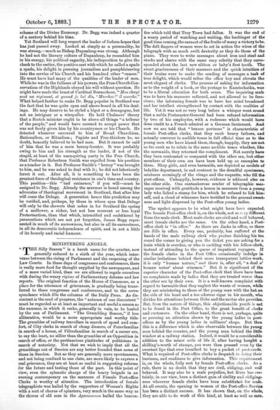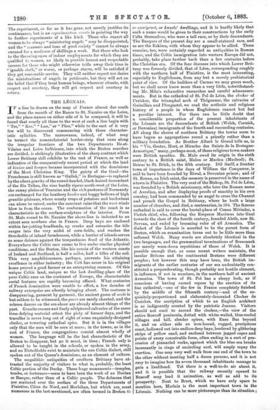MINISTERING ANGELS.
" THE Silly Season" is a harsh name for the quarter, now generally reduced to a sixth of the year, which inter- venes between the rising of Parliament and the reopening of the
Law Courts. In these days of congresses and conferences, there is really more food for thought supplied by the newspapers, and of a more varied kind, than we are allowed to regale ourselves with during the weary regime of Parliamentary debates and law reports. The original function of the House of Commons, as a place for the utterance of grievances, is gradually being trans- ferred to these congresses and conferences, and to the corre- spondence which fills the columns of the Daily Press. As dis- content is the seed of progress, the "autumn of our discontent" must be regarded as at least as important and useful a season as the summer, in which it seeks, generally in vain, to be healed by the sun of Parliament. "The Grumbling Season," if less alliterative, would be a more appropriate and worthy title. The grumbles of railway travellers in search of speed and com- fort, of City clerks in search of cheap dinners, of Paterfamilias in search of a house, of Filiasfamilias in search of a career are, to say the least, no sillier than the grumbles of an Opposition in search of office, or the pertinacious platitudes of politicians in search of notoriety. Not that we wish to imply that all the grumblings out of Session are any better founded than some of those in Session. But as they are generally more spontaneous, and not being confined to one class, are more likely to express a real grievance, they are at least as useful in suggesting reforms for the future and testing those of the past. In this point of view, even the splenetic charge of the heavy brigade in an evening contemporary on the manners of Female Post-office Clerks is worthy of attention. The introduction of female telegraphists was hailed by the supporters of Woman's Rights with a sort of chorus of spinsters, very much in the same way as the chorus of old men in the .Agamemnon hailed the beacon-
fire which told that Troy Town had fallen. It was the end of a weary period of watching and waiting, the harbinger of the good time coming, the earnest of the fruits of many a victory to be. The deft fingers of women were to set in action the wires of the telegraph with as much swift dexterity as they do those of the piano. They were to write messages about iron and steel and stocks and shares with the same easy celerity that they corre- sponded about the last new ribbon or baby's first tooth. The sweet graciousness of their manners and the quick intuition of their brains were to make the sending of messages a task of true delight, which would refine the office boy and elevate the most elegant of clerks. The process of asking for information as to the weight of a book, or the postage to Kamtschatka, was to be a liberal education for both sexes. The inquiring male was to have his manners softened, and not allowed to be fero- cious; the informing female was to have her mind broadened and her intellect strengthened by contact with the realities of life. Yet it was not so very long before a whisper went round that a noble Postmaster-General had been refused information by two of his employ des, with a rudeness which would have done credit to a French admiral or a German lieutenant. And now we are told that "brazen pertness" is characteristic of female Post-office clerks, that they snub heavy fathers, and actually converse in audible tones in full official time as to the young men who have kissed them, though, happily, they are not so far sank as to relate in the same audible tones whether, like the mermaids, they returned the compliment. Not merely have they been contrasted or compared with the other sex, but other members of their own sex have been held up as examples to them. Shop girls, and even barmaids, are depicted as models of ladylike deportment, in sad contrast to the dreadful specimens, mixtures seemingly of the virago and the coquette, who fill the post-offices. Unhappily, however, evidence is adduced also on the other side. One cantankerous sender of telegraphic mes- sages received. with gratitude a lesson in manners from a young lady who licked a stamp for him, which he refused to lick him- self, and a cloud of witnesses have testified to the general sweet- ness and light dispersed by the Post-office young ladies.
The upshot appears to be what might have been expected. The female Post-office clerk is, on the whole, not so very different from the male clerk. Most male clerks are civil and well behaved, most female clerks are the same. On the other hand, a Poet- office clerk is "in office." As there are Jacks in office, so there are Jills in office. Every one, probably, has suffered at the hands of the male railway clerk who prefers finishing his tee. round the corner to giving you the ticket you are asking for a train which is overdue, or who is cackling with his fellow-clerk, instead of attending to the queue of impatient voyagers. If the female clerks in the Post Office occasionally indulge in similar irritations behind their more transparent lattice-work, it is only "human nature," and there is, after all, "a deal o' human natur' about wimmen." But it is significant of the superior character of the Post-office clerk that there have been no complaints made by ladies that they are treated worse than the other sex by their own. It is a well-known complaint with regard to barmaids that they neglect the wants of women, white they are ministering to those of the young man with the hat on the side of his head and a too odorous cigar in his month, whe divides his attentions between Hebe and the nectar she provides.. But, from the nature of things, this objectionable youth is net to be found in the Post Office, to the great benefit of clerks and customers. On the other hand, there is not, perhaps, quite so pressing an attention shown by the young ladies in post- offices as by the young ladies in milliners' shops. But then this is a difference which is also observable between the young man behind the counter, and the young man behind the little window at a railway station. Indeed, it would be a considerable addition to the minor evils of life if, after having bought a shilling's-worth of stamps, you were then pressed even by the sweetest lips that ever breathed to buy a packet of post-cards. What is required of Post-office clerks is despatch in doing their business, and readiness to give information. This requirement is, on the whole, fully met by female Post-office clerks. As a rule, there is no doubt that they are civil, obliging, and well behaved. It may also be a male prejudice, but there has cer- tainly, in our view, been a distinct gain of civility and obliging- nese wherever female clerks have been substituted for male. At all events, the opening to women of the Post-office Servile has been a distinct success. It has shown that, on the whole, they are able to do work of this kind, at least as well as men, The experiment, so far as it has gone, not merely justifies its continuance, but is an experinzentum crycis in pointing the way to further experiments of a like kind. Those who expect all women to be always "ministering angels" may be disappointed,. and the "manners and tone of good society" cannot be always ensured for a modicum of shillings a week. But those who look to the throwing-open of indoor employments for which they are qualified to women, as likely to provide honest and respectable careers for those who might otherwise trifle away their time in "ignoble sloth," or worse, or perhaps starve, will be satisfied if they get reasonable service. They will neither expect nor desire the ministrations of angels in petticoats, but they will act on the belief that if they treat human beings, wherever situate, with respect and courtesy, they will get respect and courtesy in return.



































 Previous page
Previous page